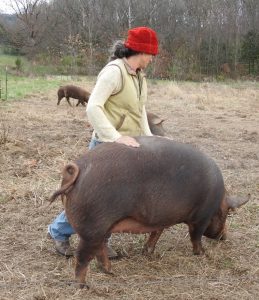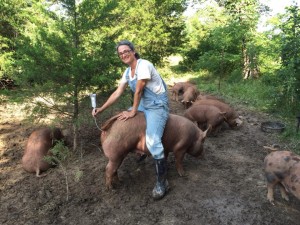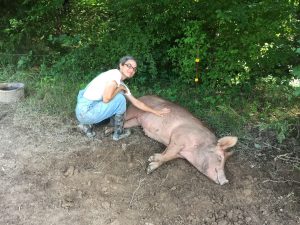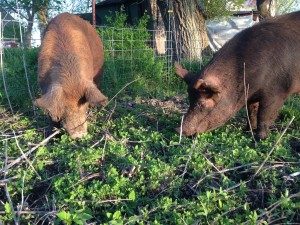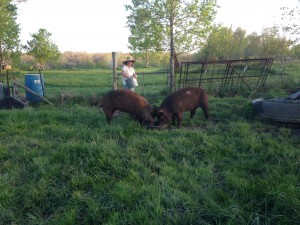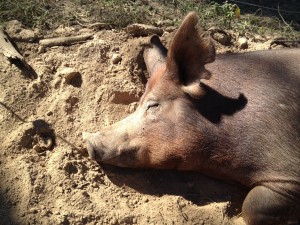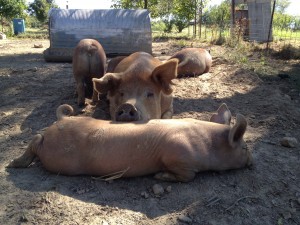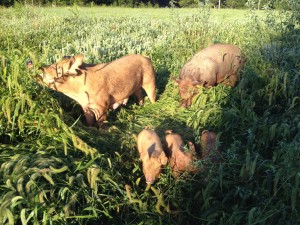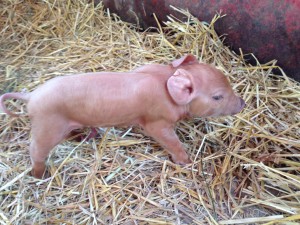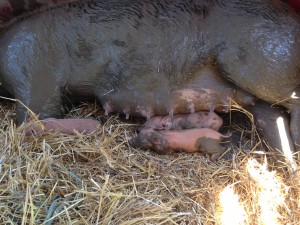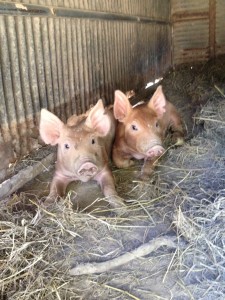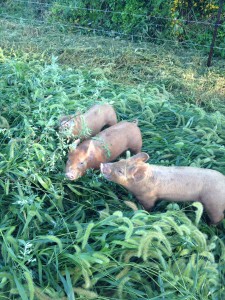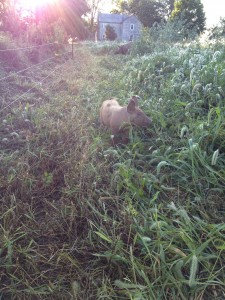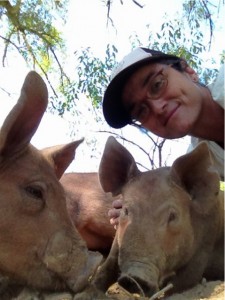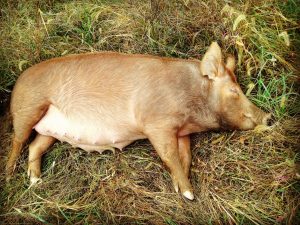 When we have a pregnant pig, I am beside myself with anticipation. I am constantly checking for discharge that would indicate a miscarriage, giving out extra belly rubs, and trying to see and feel any movement. The closer it gets to farrowing day, the more I check on them and the more I worry.
When we have a pregnant pig, I am beside myself with anticipation. I am constantly checking for discharge that would indicate a miscarriage, giving out extra belly rubs, and trying to see and feel any movement. The closer it gets to farrowing day, the more I check on them and the more I worry.
It takes a sow 114 days from breeding to give birth or farrow. It is commonly calculated as 3 months, 3 weeks, and 3 days. Sows are pretty spot on when it comes to the due date. With a gilt, or first time mom, it can be +/- one or two days, but usually it is exactly 114 days.
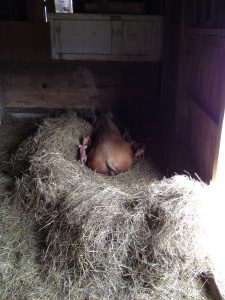
Gertie farrowed right on day 114. She was sharing a paddock with Flossie and Corky, and 2 days before her due date, we split the paddock so only she could get in the barn. We cleaned out the barn and added a nice thick layer of hay. The day before, she would lay on the cool ground and I would rub her belly. If I stopped, she would give me a grunt. I could see the babies moving around and knew we were close. She had also made a HUGE nest of hay and straw. When she farrows inside the nest, all the babies are contained. The day of, I checked on her every hour or so, but she wasn’t ready until 9pm. I came in and saw 1 baby looking for a teat. I walkie-talkied Fred that it was time and bring the supplies.
When Gertie first farrowed with us, a baby was stuck (hence that baby’s name-Corky) and we gave oxytocin to help push it out. Later I learned that should have been the last resort and manual manipulation was the better course of action. Now we have a supply kit with gloves and lubricant. Since it was cold, we had towels to quickly dry them off. One after another they were born and once dry, started nursing. Fred went home and I would radio back with updates…number 7, then 8 and 9, 10, 11, a lag until 13 and 14. It was a long exciting night for me.
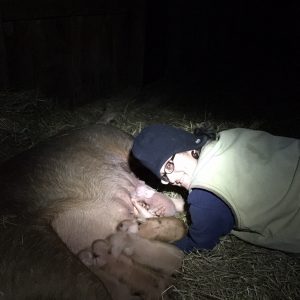
Baby pigs hit the ground running, literally. They come out, wriggle out of the sac, and start for the teats. They may not know where they are going, but they are going! You can tell they are listening to the sow and siblings to find the food.
Two of the piggies were runts. They were half the size of the others. We tried our best to keep them warm and get them nursing, but they didn’t make it. One just disappeared. When a baby dies, to keep predators away, the sow will either remove the baby or eat it. Sometimes, the sow will just eat each baby as it is born. When I found this out, my anxiety level about the whole thing went through the roof. I worry about the animals health when everything is going well, this was something I just didn’t want to have to witness. Thankfully Gertie was a great mom to all 11 babies.
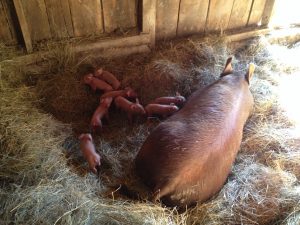
When Corky farrowed her 8 babies, I missed the whole thing. I KNEW she was close when she went from begging for belly rubs to jumping up and going after me, only to flop back down and grunt for me to rub her more. She was due on a Sunday, but delivered in the wee hours of Saturday morning. When Fred went to feed that morning, he came back to report 8 healthy babies all nursing. I was bummed, but happy all seemed to go well. The first farrowing can be difficult and some gilts will have what they call “gilt hysteria”. They basically freak out about farrowing and can either eat or trample all the babies. We were very lucky she was such a good mom.
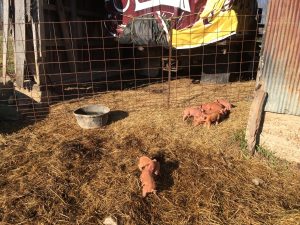
There are a few things we don’t do to babies that other producers do. Every time you handle a baby, you put yourself and them at risk–sows do NOT like to hear their babies squeal and can charge at you and trample any baby in the path. Some producers try to breed to have mellow sows so they can handle the babies without issue. But as far as I can tell, momma protects baby and that’s that.
We don’t give iron shots. If the babies and mom are on dirt, they can get all the iron they need from that. The sow will get in the mud, go back to the babies, they latch onto nurse — instant iron boost.
We don’t clip needle teeth. Those babies have some sharp teeth. And yes, they scratch each other up and blood on a tail is not uncommon and I am sure all the grunting the sow does is her telling them to knock it off with the teeth already and just suck! But everyone survives just fine.
We don’t dock tails. The reason for doing this is so they will not bite off each others tails. Again, we have had tail biting, but everyone heals up just fine. With plenty room to move around, I don’t know why they would get aggressive enough to take off a tail.
We don’t ear notch. A special tool is used to cut a “V” notch in a certain pattern on the outer edge of the ears. It’s done at about 2 days old, so the blood hasn’t begun to circulate through the outer ear. The notching system numbers each pig for identification and registering. To register Tamworths it’s required to ear notch, so we don’t register.
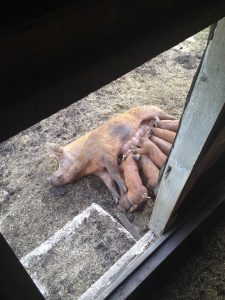
We don’t separate to wean until after 10 weeks old. The babies, and sow, will naturally wean around this time. Once feed intake has increased, we will separate everyone in adjoining pens for a week or so to let the sow dry up.
We do castrate our male babies. We both hate this and wish like heck to have as many girls as possible. Castration is done before 7 days old, usually between 3-5 days. After 3 days they have had a good dose of colostrum, have the sow’s antibodies in them, and their immune system is kicking in. Fred holds them upside down, I clean the area and find the testes, make two slits with a sterile blade, pop them out and pull. Cutting can do more harm than pulling. When you pull it breaks off at just the right place. We don’t apply any antiseptic to reduce the stinging and them rubbing the ground. After a day or two the swelling has gone down and the slots have a nice scab. In about a week, it will be completely healed.
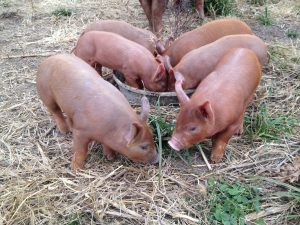
Once a sow farrows, her feed intake increases by 1 pound of feed per piglet on top of their normal ration. Gertie was getting 16 pounds of feed a day and had the milk production to prove it. The babies will gain about a pound a day nursing. The first few days is a lot of sleeping and nursing. By day 3 they are following momma onto the pasture. They start rooting almost immediately in the nest and nibbling at grass at about a week old. After a few weeks, the piggies begin to get interested in momma’s feed and they slowly start to eat their own ration until they are not interested in nursing.
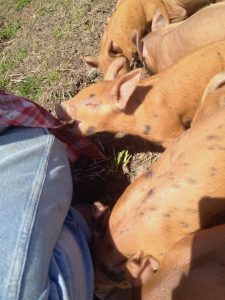
Unlike Gertie’s previous litter of 3, her new babies wanted nothing to do with me. As much as I tried to befriend them, it just wasn’t happening beyond an occasional belly rub or ear scratching. I missed all the loving I could give Shooter and Corky–getting them to flop over with legs in the air for belly rubs or snuggling next to them in the hut. These new babies would let me scratch on them, realize what was happening, snap out of it, and run away. During feedings I would get as many scratches in as I could. They weren’t unfriendly or skittish, they just didn’t want to be snuggle buddies. So all this time from farrowing to 7 months, I do my best to make sure they are getting as much attention as they will allow me to give. In that time, whether they feel the same or not, I become attached to them. I love that the one with big jowls like his dad will let me scratch him only when no one else is watching. I love calling them through the woods and having them follow me. I love the time after feeding when they all just lounge around and one will come over to sniff at me and plop down a few feet away.
Corky’s babies were a little more interested in me. I would go in twice a day while Corky ate and give them rubs and talk to them. One girl would always come and lay next to me while I scratched her. Now when I come to see them, everyone runs up and all around me trying to figure out the best way to eat my boot or pant leg. And one by one, I start to rub their bellies and they start dropping like flies with big smiles on their faces. And just like with Gertie’s litter, I am attached to them. After all, the reason we spend so much time and effort in how we raise them is so they will have a good life and that includes being loved. 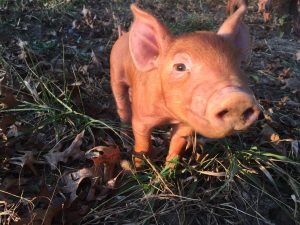
Next…Part 3–The Piggies Go To Market.
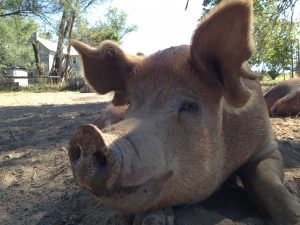 I had no experience raising pigs before moving to Missouri. Fred grew up raising and butchering pigs, so all of this is old hat to him. With my vast
I had no experience raising pigs before moving to Missouri. Fred grew up raising and butchering pigs, so all of this is old hat to him. With my vast